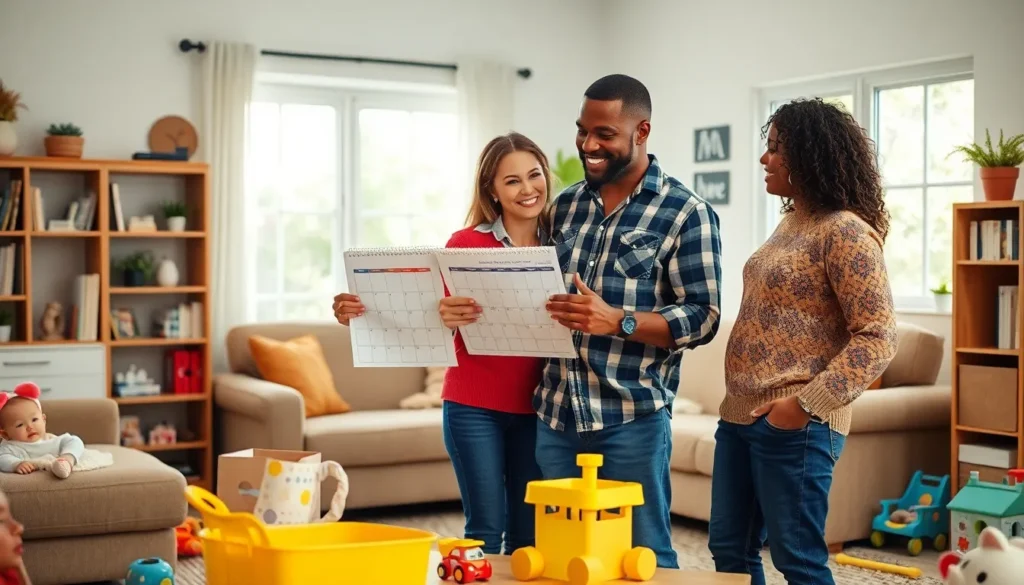Table of Contents
ToggleNavigating the world of co-parenting can feel like trying to assemble IKEA furniture without the instructions—frustrating and often messy. It’s a delicate dance where two people must work together, even if they can’t agree on which way the toilet paper rolls. From scheduling conflicts to differing parenting styles, the challenges can seem endless, but there’s hope.
With a sprinkle of humor and a dash of understanding, co-parenting can transform from chaotic to cooperative. It’s all about finding common ground and learning to communicate effectively. Whether it’s sharing the kids’ soccer schedules or managing holiday plans, tackling these challenges head-on can lead to a more harmonious family life. Embracing the quirks of co-parenting not only strengthens the bond between parents but also sets a positive example for the kids.
Overview of Co-Parenting Challenges
Co-parenting presents unique difficulties that can impact family dynamics. Understanding these challenges is essential for creating a supportive environment for children.
Definition of Co-Parenting
Co-parenting involves both parents sharing responsibilities in raising children after separation or divorce. This arrangement requires cooperation, clear communication, and commitment to the child’s well-being. Parenting plans often outline schedules and guidelines, addressing issues like education and healthcare. Successful co-parenting relies on both parents prioritizing their child’s needs while navigating their own emotions and relationships.
Importance of Effective Co-Parenting
Effective co-parenting promotes stability for children amidst changes. Research shows children thrive when parents work together, providing consistency and support. Clear communication minimizes conflicts, allowing parents to focus on their child’s needs. Parents set an example of teamwork and respect, teaching children vital interpersonal skills. When co-parents collaborate, they foster a healthier environment, reducing stress for everyone involved. Choices made by co-parents directly influence children’s emotional and psychological development, highlighting the significance of a united front.
Common Co-Parenting Challenges

Co-parenting presents various challenges that can affect family dynamics. Understanding these challenges is crucial for successful co-parenting.
Communication Issues
Lack of clear communication often leads to misunderstandings between co-parents. Misinterpretations can occur when parents rely on text messages or emails instead of face-to-face conversations. Frustrations arise from vague messages or non-responses. It’s essential for co-parents to establish regular check-ins to discuss schedules and concerns. Active listening helps ensure that both parties feel heard and understood. Utilizing tools like shared calendars can provide clarity and reduce miscommunication. Commitment to open dialogue fosters a collaborative approach to parenting.
Conflict Resolution
Managing conflicts effectively is vital for maintaining a healthy co-parenting relationship. Disagreements can stem from differing parenting styles or logistical challenges regarding the child’s needs. Seeking to understand the other parent’s perspective aids in finding common ground. Mediation services can assist in resolving disputes when feelings run high. Focusing on solutions, rather than problems, promotes a positive environment. Timing discussions during calm moments allows for more constructive conversations. Agreeing on rules and boundaries together creates consistency for the child. Implementing these strategies nurtures respect and cooperation, essential for successful co-parenting.
Emotional Impact on Children
Co-parenting challenges significantly influence children’s emotional well-being. The effects of parental actions and decisions resonate deeply within their lives.
Effects of Parental Conflict
Parental conflict negatively affects children’s emotional health. Children exposed to high levels of conflict often experience increased anxiety and insecurity. Research shows that these children may struggle with trust issues and develop behavioral problems. They can internalize parental disagreements, leading to feelings of guilt or blame. Some may exhibit difficulties in forming friendships due to these unresolved emotions. Establishing a peaceful co-parenting environment fosters a sense of security, enabling children to thrive in their relationships. Prioritizing conflict resolution minimizes negative emotional outcomes for children while reinforcing healthier interactions.
Importance of Stability
Stability plays a crucial role in children’s development during co-parenting. Consistent routines and clear expectations contribute to a sense of safety and predictability. Children who experience stability are less likely to show signs of stress and anxiety. A structured environment encourages emotional resilience, promoting overall well-being. Parents who collaborate effectively provide a supportive backdrop for their children, guiding them through changes with assurance. Maintaining stability in co-parenting fosters stronger emotional bonds and healthier coping strategies, helping children navigate challenges with confidence.
Strategies for Successful Co-Parenting
Successful co-parenting relies on effective communication and respect for one another’s boundaries. Implementing these strategies can significantly enhance the parenting experience.
Establishing Clear Communication
Clear communication stands as a fundamental pillar in co-parenting. Parents should establish regular check-ins to discuss schedules and children’s needs. Utilizing shared calendars fosters transparency and helps avoid conflicts. Parents often need to practice active listening, ensuring each person feels heard and valued. It’s essential to address concerns promptly to prevent misunderstandings. Open dialogue establishes a cooperative environment, benefiting both parents and their children.
Setting Boundaries and Respect
Setting boundaries promotes respect between co-parents. Each parent must clearly articulate their expectations regarding parenting styles, discipline, and household rules. Discussing these boundaries helps prevent conflict and provides consistency for children. Parents should also respect each other’s time and personal lives, understanding that both parties deserve space. Establishing guidelines reinforces a positive co-parenting dynamic, which ultimately benefits the child. Respectful interactions model healthy relationships and teach children vital communication skills.
Legal Considerations in Co-Parenting
Understanding legal considerations is vital in co-parenting scenarios. Child custody agreements outline the living arrangements, visitation rights, and decision-making authority for both parents. Custody can be joint or sole, depending on the family’s dynamics and the best interests of the child.
Court orders serve as essential frameworks for co-parenting. These documents can specify everything from childcare responsibilities to schooling decisions, establishing boundaries that reduce conflicts. Parenting plans often accompany these orders, detailing day-to-day routines and holiday schedules.
Mediation can become a valuable tool for resolving disputes. When parents face disagreements, seeking mediation allows them to find common ground without escalating conflicts to court. This process promotes collaboration over confrontation, enhancing communication between parents.
Involvement of legal professionals can significantly influence outcomes. Attorneys can provide guidance on rights and obligations, ensuring that both parents understand their responsibilities. They can also assist in drafting or modifying custody agreements to reflect changing circumstances.
Modifications to custody arrangements may become necessary as children grow and family situations evolve. Legal procedures surrounding changes typically require substantial evidence demonstrating that the adjustments serve the child’s best interests. Courts often look favorably on parents who prioritize their child’s well-being in these modifications.
Compliance with existing agreements is essential. Failing to adhere to court orders can result in legal repercussions, affecting custody rights and visitation arrangements. Maintaining open communication helps uphold these legal commitments and fosters a cooperative parenting environment.
Overall, legal considerations play a crucial role in co-parenting. Securing clear agreements, utilizing mediation, and staying informed about legal obligations all contribute to building a successful parenting partnership.
Support Resources for Co-Parents
Co-parents can access various support resources designed to facilitate successful parenting. Parenting classes provide valuable skills for effective communication and conflict resolution. Local community centers often offer workshops that focus on co-parenting strategies tailored to specific needs.
Online resources play an essential role in connecting co-parents. Websites such as Co-Parenting101 and OurFamilyWizard feature articles, forums, and tools that assist with scheduling and communication. Many co-parents find these platforms helpful for sharing experiences and learning from others.
Support groups present an opportunity for co-parents to connect with peers facing similar challenges. Local organizations may host regular meetings, allowing individuals to share insights, frustrations, and solutions in a supportive setting. These groups often create a sense of community, reducing feelings of isolation.
Counseling services also serve as valuable resources. Professionals specializing in family therapy can aid co-parents in navigating emotional obstacles and improving their parenting partnership. Therapists help identify unhealthy patterns and facilitate constructive dialogue between co-parents.
Legal aid organizations offer assistance regarding custody agreements and parental rights. Accessing these services ensures co-parents understand their responsibilities and options. Legal professionals can guide individuals through the complexities of family law, aiding in modifying agreements as circumstances change.
Parenting apps, like TalkingParents and Coparenter, provide digital solutions for communication and organization. These tools streamline the sharing of schedules, expenses, and important information related to the children. Using technology can enhance accountability and clarity between co-parents.
Community resources remain essential in fostering effective co-parenting. By utilizing local services, online platforms, and professional assistance, co-parents can cultivate a positive environment for their children and promote collaboration.
Co-parenting can be a challenging journey but it also offers opportunities for growth and collaboration. By prioritizing effective communication and mutual respect parents can create a nurturing environment for their children. Emphasizing stability and consistency helps children thrive emotionally and psychologically. Utilizing available resources and strategies fosters cooperation and minimizes conflict. Ultimately, a commitment to teamwork not only benefits parents but also sets a positive example for the next generation. With patience and understanding co-parents can navigate their unique challenges and build a supportive family dynamic.





